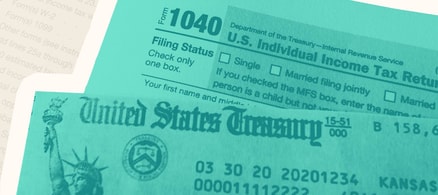Income from multiple income streams
It's common for Americans to have more than one source of income, and the rise of the "gig economy" is one reason why.
While the majority of workers — 64% — are still employed at just one job, more than a quarter (28%) have side hustles, the 2019 Gallup Great Jobs Survey found.
Besides the "wages, tips [and] other compensation" reported by a traditional employer on a W-2 tax form, you may have:
- Self-employment income, if you've started your own small business.
- Earnings from a side gig, such as freelance writing or driving for Uber Eats.
- Investment income, like dividends and interest.
If you're retired, your mix of income may include:
- Social Security.
- Withdrawals from a 401(k), IRA or other retirement account.
- Pension payments.
With so many possible income streams, calculating the correct income figure for tax purposes can be tricky.
Meet Your Retirement Goals Effortlessly
The road to retirement may seem long, but with WiserAdvisor, you can find a trusted partner to guide you every step of the way
WiserAdvisor matches you with vetted financial advisors that offer personalized advice to help you to make the right choices, invest wisely, and secure the retirement you've always dreamed of. Start planning early, and get your retirement mapped out today.
Get StartedEarned vs. unearned income
The IRS puts taxable income into two main categories: earned income and unearned income.
Your earned income is made up of:
- Money you receive from an employer.
- Any money you make working for yourself, either as a freelancer or a business owner.
Your unearned income includes any money not received in exchange for work, such as:
- Investment dividends.
- Interest.
- Child support.
- Social Security payouts.
The two types of income are taxed differently. Earned income is subject to Social Security and Medicare payroll taxes, in addition to federal and state income tax. Unearned income does not trigger the payroll taxes.
How do I calculate my taxable income?
To determine your taxable income, you first you need to calculate your adjusted gross income or AGI.
It represents all the taxable income you’ve earned minus any adjustments you’re eligible for. These might include tax credits for dependent children, and any deductions. You may take the standard deduction, or itemize deductions and take write-offs for medical expenses or gifts to charity, among others.
If you use tax software from TurboTax or another provider, it will help you report most types of earnings — such as wages, dividends and taxable interest — in the "Income" section of your Form 1040 tax return.
Some less typical sources of income — including income from a business, unemployment compensation or gambling winnings — may go onto an additional form called an IRS Schedule 1.
Schedule 1 has a section to list adjustments subtracted from your income, such as contributions to a traditional IRA or health savings account, and up to $2,500 in student loan interest.
More: Overlooked tax breaks and deductions
Stop overpaying for home insurance
Home insurance is an essential expense – one that can often be pricey. You can lower your monthly recurring expenses by finding a more economical alternative for home insurance.
SmartFinancial can help you do just that. SmartFinancial’s online marketplace of vetted home insurance providers allows you to quickly shop around for rates from the country’s top insurance companies, and ensure you’re paying the lowest price possible for your home insurance.
Explore better ratesWhat types of income do I need to pay tax on?
Some of the most common types of taxable income include:
- Wages, salaries and tips.
- Money earned through freelancing and self-employment.
- Jury duty fees you were paid.
- Income from a rental property.
- Awards, gambling, lottery and contest winnings and prizes.
- Unemployment benefits.
- Capital gains, in most cases.
- Severance pay from an employer.
- Investment interest and dividends.
- Any canceled debts, except those wiped clean by bankruptcy.
What income is nontaxable?
Don't make the mistake of assuming that taxes are owed on all the money that comes your way. Many forms of income are nontaxable, such as:
- Benefits received via workers' compensation.
- Child support you receive.
- Life insurance death benefits, in most cases.
- Social Security disability benefits, in most cases.
- Disability insurance payments, if you paid the premiums with after-tax dollars.
- Capital gains from selling your primary residence, within limits.
- Gifts from friends and family.
- An inheritance. (There is no federal inheritance tax, though a few states have them.)
- Scholarships or fellowship grants.
For the full rundown of both taxable and nontaxable income, check IRS Publication 525.
How much tax will I owe in the end?
Once all of your taxable income has been added up, and deductions and credits are subtracted, the result is your adjusted gross income. Your tax is then determined by your tax bracket.
Based on your adjusted gross income and your filing status (married, single, etc.), you’ll be subject to up to seven tax brackets: 10%, 12%, 22%, 24%, 32%, 35% and 37%.
An initial portion of your income will be taxed at a 10% rate, and you may pay 12% on a second portion, 22% on a third portion, on up to as much as 37% on a share of your income if you're among America's highest earners.
Essentially, the higher your taxable income, the higher the amount of tax you pay.
Can I reduce my taxable income?
You can lower your taxable income by taking all of the adjustments you’re legally entitled to, especially tax deductions.
Did you donate a lot of clothing to a thrift store? You may qualify for the deduction for gifts to charity. Did you pay unreimbursed medical bills? You may be able to write them off. Some mortgage interest is still deductible.
The 2017 tax law made it more difficult to itemize deductions, but you may find you have enough write-offs to take more than the standard deduction — and pay less taxes as a result.
Another strategy to cut your tax bill is to maximize your retirement contributions. By diverting more of your paycheck into a tax-deferred IRA, you’ll have less income remaining to be taxed on.
If you receive a year-end bonus, you can ask your employer to hold it until after the start of the new year. The bonus won’t be included in your income and you won’t pay taxes on it until later. This is especially useful if your bonus would push you into a higher tax bracket.
Tips on filing taxes
Knowing your taxable income is essential to avoid overpaying or underpaying your taxes — but that's not always easy to grasp.
To avoid paying too much, receiving a too-small refund or being subject to penalties for mistakes on your tax return, you’ll need to understand which income you receive is taxable, so that your adjusted gross income will be calculated correctly.
To cut down on the hassle — and eliminate any worry about errors — consider working with tax experts like those at H&R Block. They’ll help you file faster, on time and accurately — for less than you might expect.
More: How to file your taxes for the first time
Sponsored
Follow These Steps if you Want to Retire Early
Secure your financial future with a tailored plan to maximize investments, navigate taxes, and retire comfortably.
Zoe Financial is an online platform that can match you with a network of vetted fiduciary advisors who are evaluated based on their credentials, education, experience, and pricing. The best part? - there is no fee to find an advisor.







